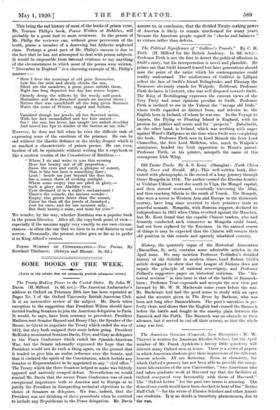SOME BOOKS OF THE WEEK.
IlVolies in this column doss not nocusarily preclude subsequent reeinal The Treaty-Making Power in the United States. By John W. Davis. (H. Milford. Is. 6d. net.)—The American Ambassador's address at Oxford on February 20th last has been reprinted as Paper No. 1 of the Oxford University British-American Club. It is an instructive review of the subject. Mr. Davis takes exception to the suggestion that President Wilson should have invited leading Senators to join the American delegation to Paris. It would, he says, have been contrary to precedent. President Madison sent Senator Bayard and Henry Clay, the Speaker of the House, to Ghent to negotiate the Treaty which ended the war of 1812, but they both resigned their seats before going. President MCKinley nominated Senators Davis, Frye, and Gray as delegates to the Peace Conference which ended the Spanish-American War, but the Senate informally expressed the hope that the President would not do such a thing again, on the ground that it tended to give him an undue influence over the Senate, and that it violated the spirit of the Constitution, which forbids any Senator or Representative to be appointed to any civil office." The Treaty which the three Senators helped to make was bitterly opposed and narrowly escaped defeat. Nevertheless we would remind Mr. Davis that the recent Peace Conference was of such exceptional importance both to America and to Europe as to justify the President in disregarding technical objections to the choice of Senators as delegates. We fear, indeed, that the President was not thinking of these precedents when he omitted to include any Republicans in the Peace delegation. Mr. Davis assures us, in conclusion; that the divided Treaty-making power
of America is likely to remain unreformed for many years, because the American people regard its "checks and balances" as virtues rather than defects.


































 Previous page
Previous page